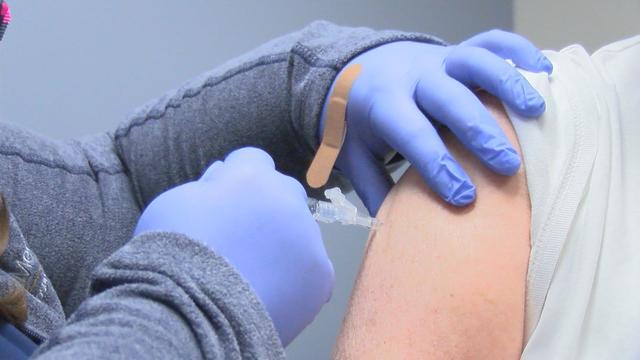RALEIGH, N.C. (WBTV) - A new study finds North Carolina non-profit hospitals are piling millions of dollars of debt on poor patients who need medical care but can’t afford it.
The study by the National Academy of State Health Policy and the North Carolina State Health Plan found patients who should qualify for free medical care are being charged by hospitals instead.
The findings were released Wednesday after a WBTV Investigation on Monday found hundreds of families in Mecklenburg County are facing lawsuits for medical bills many of them can’t afford.
During their news conference at the General Assembly in Raleigh, State Treasurer Dale Folwell and a bipartisan group of lawmakers called on tax-exempt hospitals to step up or potentially face new regulation.
Treasurer Folwell specifically mentioned WBTV’s reporting and the circumstances of Mary and Patrick Oliver, who are currently being sued by Atrium Health for medical bills they accrued in less than 24 hours at the hospital.
“Police officer came to the door to deliver the papers and when I opened it up we could not believe it,” Mary Oliver told WBTV.
Patrick Oliver went to the Atrium’s ER when he started feeling numbness in his feet and hands. After an MRI and other tests, they were billed more than $29,000 and, in October, Atrium sued the couple for more than $17,000. More than one-hundred families in Mecklenburg County are in the same situation according to court records obtained by WBTV.
“We do not need a judgment, can’t afford a judgment and can’t afford all of that money,” Mary Oliver said.
During the news conference Wednesday, North Carolina State Treasurer Dale Folwell highlighted WBTV’s reporting while releasing a new study on the lack of charity care in the state’s tax-exempt hospitals. Treasurer Folwell even disclosed that he is intentionally not paying medical bills in order to go through the collections process and find out what many North Carolina families are facing.
“They (The Olivers) don’t know who these legislators are, or that I’m the Treasurer, and that’s not what’s important today. What’s important is that we know who they are and the plight that they’re going through,” Folwell said.

The new study finds that NC non-profit hospitals estimated they had given up on collecting more than $149 million in bills sent to impoverished patients who should have qualified for charity care. Those unpaid bills become a stain on the credit of patients who needed the care but can’t afford it.
In total the report found that in FY2019 more than 28 percent of bad debt for the hospitals should have been charity care.
The report also found some hospitals rely on collecting debt by using companies that sign patients up for medical credit cards.
“To me it’s predatory lending, is what it sums up to be. That is not right,” Rep Edward Goodwin said.
However, the numbers provided for the amount of poor patients facing debt collections from hospitals is likely underestimated.
According to the report, 42 hospitals, including Charlotte’s two biggest hospital systems, Atrium and Novant, reported billing $0 to any poor patients eligible for charity care.
The report also notes that there is a lack of transparency when it comes to hospitals financials and IRS filings.
Publicly-owned hospital systems like Atrium and UNC Health are not required “to deliver the same transparency in their 990 tax returns as other nonprofits.”
“There isn’t transparency. If there was transparency you would know the exact dollar amount and you would know exactly what it was spent on,” Marilyn Bartlett with the National Academy of State Health Policy said.
“You have to deal with the transparency issue first but that’s just the first step. There are other actions that need to be taken,” said Dr. Vivian Ho with the James A. Baker Institute Chair in Health Economics at Rice University.
Other states have taken those steps.
According to the report “Utah and Illinois both require hospitals to spend more on their community benefits than they receive in property tax exemptions.”
Lawmakers said they want to start holding talks with hospital systems before drafting legislation.
“We need some accountability, there needs to be some transparency and I hope and I pray that we can work together to fix the issue,” Rep. Howard Hunter said.
WBTV reached out to both Atrium and Novant with questions about medical credit cards, financial transparency and working with lawmakers.
In an email, a spokesperson for Atrium did not answer WBTV’s specific questions, but instead highlighted the amount of charity care recently provided to impoverished patients.
Statement from Atrium Health
Last year alone, Atrium Health provided more than $437 million in services to over 100,000 uninsured patients who never received a bill for their care. To put that into perspective, that would equate to free care provided for 1 in 10 residents of Charlotte. We also extended more than $400 million in additional free charity care and discounts through one of our many assistance programs. When patients accumulate bills and need help and we are provided with the proper information, we can help them select plans or programs that could help them resolve – or eliminate – their debt.
Atrium Health doesn’t turn anyone needing medical care away, regardless of their ability or inability to pay for their care. Our most recent audited report in 2020 demonstrates that we provided more than $2.3 billion in free and uncompensated care and community benefit across our enterprise, including more than $910 million in Mecklenburg County alone. We provide the most health care to residents throughout North Carolina and we are also the largest provider of community benefit, including more than $1.34 billion in unreimbursed costs to treat the most Medicare and Medicaid patients in the state.
As the leading nonprofit health system in the Southeast, Atrium Health has a proud history of ensuring access to high quality care for the state’s most vulnerable populations and those in need. For us, there are no profits – just outcomes, in the form of improving health, elevating hope and advancing healing – for all.
Also, additional information on this topic can be found on our Daily Dose blog: 6 Things to Know About Atrium Health’s Financial Assistance, Billing, and Charity Care
Novant Response
We use technology to allow us to see where our patients might qualify for assistance through our charity care or a state funded program. We reach out to them if they qualify via phone and/or mail through our Financial Navigators, our Guarantor Collection team and our Medicaid vendor and it is added to their accounts. If it is Medicaid, the state issues a card to them. This ensures that those patients who fall within our charity care policy are billed appropriately.
It should also be noted that included within our patient statements is documentation on how to file for financial assistance, where to find the policy on our website and an explanation of our 0% payment options . The statement also includes contact information to our Customer Service Call Center to help guide our patients through this process. Novant Health MyChart is our patient portal that provides patients with this same technology and allows them to apply for financial assistance on line once they have an established sign-on.
We do not report to the credit bureau or send to bad debt any patient who meets our Financial Assistance Policy. We do accept credit cards for payments but do not have a credit card application program. Novant Health has a 0% payment plan option for all patients that is not sponsored by a credit card company.
Copyright 2022 WBTV. All rights reserved.









